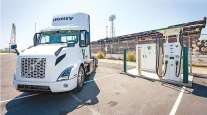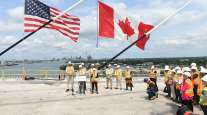Senior Reporter
Infrastructure Policy Flickers in Senate’s Return to Action

[Stay on top of transportation news: Get TTNews in your inbox.]
The head of Southwest Airlines sounded an alarm during his appearance on CBS’ “Face The Nation” on May 3.
“The demand is just not there,” CEO Gary Kelly declared. “If things don’t improve, we have to downsize. We’ve never had a furlough in our history. We’ve never had a pay cut in our history. And I’m extraordinarily proud of that. And we certainly don’t want to break that record.”
The airline, with a fleet of colorful planes, is not alone in experiencing a lack of demand. Cities are reporting decreases in across-the-board ridership. Take for instance the bus industry. If the new normal continues after this month, the American Bus Association Foundation estimates more than 64,000 positions would be cut — on an annualized basis — and the industry would lose about $11 billion in sales.

Mulero
“This is the worst crisis our industry has ever faced in our more than 100 years of business,” ABA Foundation President Peter Pantuso said April 27.
The foundation assists the American Bus Association with research and scholarships.
“We are seeing devastation worse than [Sept. 11, 2001], and we have had no help from the federal government,” he said. “When Congress was handing out $100 billion to airlines, Amtrak and public transportation, they left out the private motorcoach industry.
“If this industry fails, how will working class Americans get to their jobs? Who will evacuate Americans during wildfires, tornados and hurricanes? How will Americans get from rural areas to urban centers for work and leisure? This is going to be a less mobile world without the essential services that motorcoaches provide.”
Covid Impact by Transport Topics on Scribd
While Congress has approved for President Donald Trump nearly $3 trillion worth of emergency aid to assist with recovery efforts, the president has insisted on funding dedicated for the infrastructure networks. He argued that could pave the way for a badly needed economic rebound.
Under the direction of Majority Leader Mitch McConnell (R-Ky.), the Senate’s ethos when it reconvenes May 4 will be to evaluate current economic relief efforts. Senators also are expected to determine what huge amounts of additional aid to provide families and businesses. A robust debate on infrastructure policy as championed by Trump has yet to be scheduled.
Similar to the Senate, the House of Representatives, which probably will reconvene next week, has not set a timeline for considering infrastructure-related provisions in the near-term.
Speaker Nancy Pelosi (D-Calif.) told reporters April 30: “We talked about this before, but then [the] urgency of getting money into people’s pockets was so pervasive that it became the priority.”
Stakeholders await a compromise between the president and congressional leaders.
The Week Ahead (All times Eastern)
May 4: The Senate resumes its legislative session.
May 5, 2:30 p.m.: The Senate Banking, Housing, and Urban Affairs will meet to examine the nominations of Brian Miller to be special inspector general for pandemic recovery at the Treasury Department, and Dana Wade to be assistant secretary at the Department of Housing and Urban Development.
May 6, 10 a.m.: The Senate Committee on Environment and Public Works will consider two water infrastructure measures.
May 6, 2:30 p.m.: The Senate Commerce Committee examines the aviation industry amid the pandemic. Witnesses include Eric Fanning, CEO of the Aerospace Industries Association; Nicholas Calio, CEO of Airlines for America; and Todd Hauptli, CEO of the American Association of Airport Executives.
May 6, 10 a.m.: A House Appropriations panel reviews the response to the pandemic. Witnesses include Tom Frieden, CEO of Resolve to Save Lives, and former director of the Centers for Disease Control and Prevention; and Dr. Caitlin Rivers, senior scholar at the Johns Hopkins Center for Health Security, assistant professor in the Department of Environmental Health and Engineering at the Johns Hopkins Bloomberg School of Public Health.
Freight Corridor
The pandemic’s inevitable Elon Musk moment.
 Buzz
Buzz

Summer driving season probably will look and feel different this year. (Trips to the grocery store will be marked by minimal traffic.)
Favorite Video
Guns and roses at the Wolverine State.
Favorite Tweet
If it had been an episode of “Veep,” a staffer would have whispered: “We’ll get there fast and then we’ll take it slow.”
Today I joined @VP in Kokomo Indiana to see innovation and ingenuity at work to save lives as auto manufacturers switched from building cars to building ventilators in response to #COVID19. It was truly inspiring. pic.twitter.com/HqjeZdUqmw — Sec. Elaine Chao (@SecElaineChao) May 1, 2020
The Last Word
We don’t see it as a bailout. We see this as a partnership; doing the right thing in what is the worst healthcare crisis in the history of our nation.
New Jersey Gov. Phil Murphy at the White House on April 30
We publish weekly when Congress is in session. E-mail emulero@ttnews.com with tips. Follow us @eugenemulero and @transporttopics.
Want more news? Listen to today's daily briefing:





